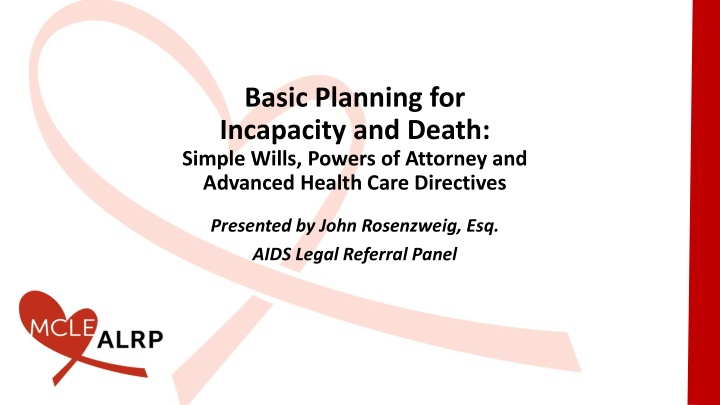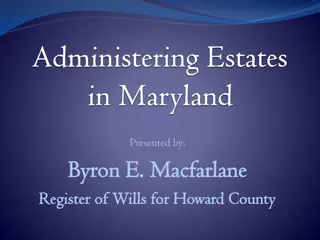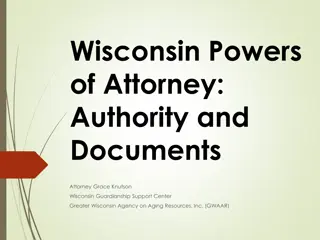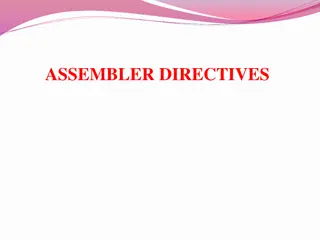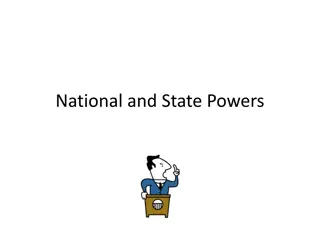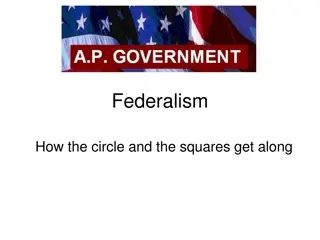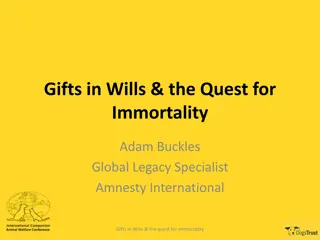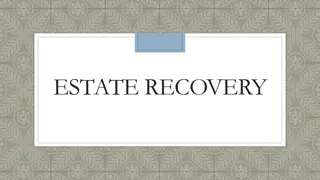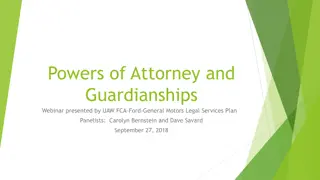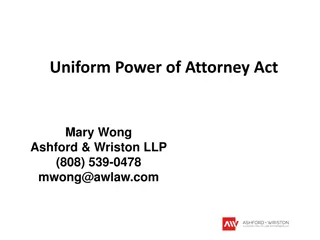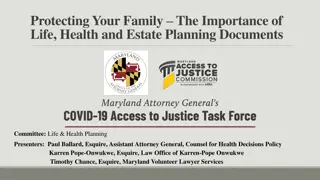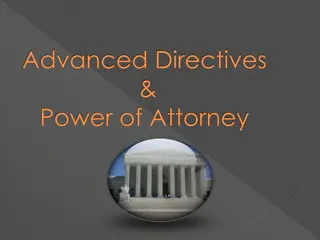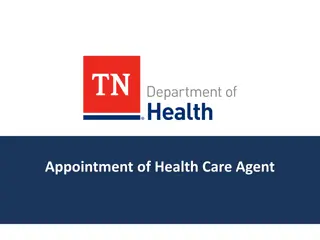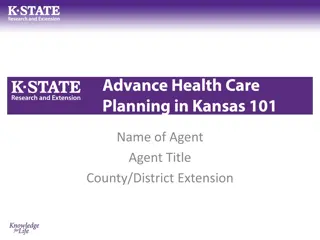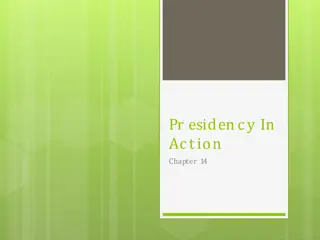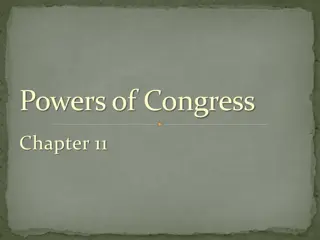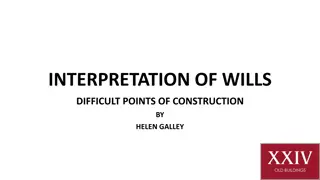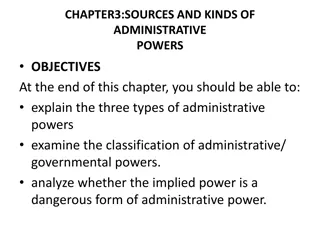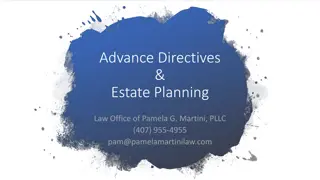Essential Estate Planning: Simple Wills, Powers of Attorney & Health Directives
Ensure peace of mind and avoid intestate succession with free legal documents like Simple Wills, Powers of Attorney, and Advanced Health Care Directives presented by John Rosenzweig, Esq. Learn about the process, client requirements, and how to avoid probate. Take proactive steps for end-of-life care and asset distribution.
Download Presentation

Please find below an Image/Link to download the presentation.
The content on the website is provided AS IS for your information and personal use only. It may not be sold, licensed, or shared on other websites without obtaining consent from the author.If you encounter any issues during the download, it is possible that the publisher has removed the file from their server.
You are allowed to download the files provided on this website for personal or commercial use, subject to the condition that they are used lawfully. All files are the property of their respective owners.
The content on the website is provided AS IS for your information and personal use only. It may not be sold, licensed, or shared on other websites without obtaining consent from the author.
E N D
Presentation Transcript
Basic Planning for Incapacity and Death: Simple Wills, Powers of Attorney and Advanced Health Care Directives Presented by John Rosenzweig, Esq. AIDS Legal Referral Panel
Overview Simple Wills, Powers ofAttorney and Advanced Health CareDirectives areessential to our clients, and areprovided freeof charge to them regardless of income A Simple Will"foranALRP client has no morethan 15specific bequests and usually avoids formal probate Power of Attorney (POA) allows someone else toact ona client's behalf onfinancial and legal matters Advanced HealthCare Directive (AHCD) appoints someone tomakehealth caredecisions on behalf ofthe client andprovides some direction to that person and to medical providers regarding end-of-life care Provide peace of mind to ourclients These basicdocuments are necessary to avoid intestate succession andtoallowclient's wishesto becarried out
Poll: Have you prepared a will for an ALRP client? Yes No
Getting information: First phone call and meeting First phone call:introduce yourself and brieflyexplain thepurposeof the documents you will bepreparingand theinformation you will need to prepare them. Clientshould bringto first meeting: names, addresses and phone numbers of executor and alternate; persons who willinherit under the will and alternates; agentsfor power of attorney and health care directives and alternates. Recommend sending to client ALRP's End of Life Planning document (included in materials). Firstmeeting at youroffice or client's home, or at ALRP offices.
Getting information: First phone call and meeting Meet individually with client if possible, or at least briefly to confirm that client's wishes are their own, even in case of wills prepared for partners or spouses - Avoid potential undue influence challenge. Will information form - all information needed to prepare will, POA and AHCD; obtain information about assets passing through will as well as retirement assets and life insurance that will pass outside of the will. Difficulty of isolated clients in choosing executor, agents for POA, AHCD. Limit representation to preparation of will, POA, AHCD. Retainer agreement.
Probate and How to Avoid it Probate is a court-supervised process for determining the validity of a will, who inherits, how much an estate is worth, paying debts, and transferring property to heirs and beneficiaries. Fees allowed by CA law are 2% of assets between $201,000 and $1,000,000 can take several months. Usually, would refer a client to an estate planning specialist for a living trust if the will would likely have to go through formal probate: Client owns real property not titled jointly or as community property with right of survivorship Client has assets not exempt from probate likely to be worth more than small estate exemption A living trust holds title to assets; successor trustee can act in event of incapacity or death; avoids probate; pourover will still necessary for assets not in trust
Probate and How to Avoid it Exceptions: Client is near death and insufficient time, or client understands the cost and time probate entails and still prefers to do a will or would like to have a will in place until client can get around to creating a trust. Probate terminates claims of creditors, so may be beneficial if client has potential claims; e.g., professional. Small estate exemption: currently $184,500 of non-exempt assets Most of our clients qualify. Exempt assets: Retirement accounts and life insurance with designated beneficiaries (other than estate); Bank accounts with Transfer on death beneficiaries; property in living trust; real property held in joint tenancy or community property with right of survivorship. Spousal or Domestic Partner Property Petition (Probate Form DE-221) allows a surviving spouse/domestic partner to get court confirmation of ownership of all community property, but estate would still have to go through probate upon death of surviving partner, so trust advisable if assets above small estate exemption.
Poll: What would be a good reason to refer a client to an estate planning specialist for a living trust? A. Client owns a San Francisco condo as tenancy-in-common with his partner B. Client has stock options in his tech company employer's stock currently worth $150,000 C. Client's only major financial asset is a 401(k) worth $250,000, and expects an inheritance of $200,000 from his grandmother, who has terminal cancer D. All of the above
Avoiding Challenges to Will, POA, AHCD Testamentary Capacity Testator must be capable of understanding: The nature and effect of making a will; The extent of their estate; The claims of those who might expect to benefit from the will (i.e., parents, children or siblings who might inherit if client died intestate) This standard is significantly lower that other standards of mental capacity Court presumes capacity; challenger must prove incapacity at the time the will was made
Avoiding Challenges to Will, POA, AHCD Undue Influence Meet with client alone if possible. If client wishes to have a partner, spouse or friend present, review testamentary scheme and key elements of POA, AHCD. If preparing wills and other documents for partners or spouses, arrange to review the documents with each client separately. Avoid making decisions for client. OK to explain legal options and implications of decisions in light of client's circumstances and conditions.
Drafting a Simple Will Essential Elements: Identity of testator Names of testator's close relatives Names of executor and alternate executor Specific bequests and names of beneficiaries, alternate beneficiaries Residuary clause Funeral and burial instructions
Drafting a Simple Will Specific bequests If client has more than 15, you can charge according to ALRP fee schedule. Alternative: client can gift remaining personal property (after specific bequests) to a trusted friend (usually executor) who will distribute property in accordance with a separate document listing items and beneficiaries. Such a document can be changed whenever client wishes without amending the will. See suggested language in Article 3 of Form Will, at bottom of page 2.
Drafting a Simple Will Drafting tips List relatives by their relationship and city of residence: e.g., "my sister, Jane Smith of Riverside, California" there is only one Jane Smith who is client's sister, but listing city of residence helps demonstrate capacity. List non-relatives by name and current address: e.g., "John Doe, currently residing at 1663 Mission St., San Francisco, California." Guards against any confusion about which John Doe the client intended to name in the will, though John Doe may have relocated.
Drafting a Simple Will Primary or residuary bequests An essential part of a will, in order to avoid having property pass by intestate succession outside of the will. There should be at least one alternate primary or residuary beneficiary, in case primary or residuary beneficiary predeceases client. Multiple alternate beneficiaries with the survivor(s) taking the property in equal shares is even less likely to result in failed testamentary scheme. If client does not have any alternate beneficiaries to name, client could designate a non-profit of the client's choice in order to avoid intestate succession.
Drafting a Simple Will Choice of executor Qualifications listed in Probate Code Section 8400 et seq: Over age of majority; not subject to conservatorship or otherwise unfit; US Resident. Trustworthy, reliable and competent. Local resident is preferred. Should name an alternate. Primary or residuary beneficiary is usually named if he or she meets qualifications. Bond is normally waived.
Drafting a Simple Will Intentional omission of potential intestate heirs Article 7 of Form Will states that any living heirs not listed in the Will are intentionally omitted, and provides a place to list former spouses, siblings, children and parents of the client. Counsel client not to use will to denigrate anyone in order to avoid potential libel suit against estate and to avoid post-death conflict.
Drafting a Simple Will Disposition of remains and instructions for funeral or memorial service Instructions in will are legally binding, but may not be discovered if will is not discovered and read until after arrangements have been made. AHCD also has a place to list such instructions. Can provide instructions in both, but make sure they're the same. Make sure executor knows where to look for instructions.
Drafting a Simple Will Guardianship of minor children Can nominate guardian in will, but not binding upon court; court will usually appoint nominee if both parents agree on nominee. If including guardianship provisions in a will, I recommend reviewing information on guardianship in ALRP AIDS Law Manual, or consult with mentor.
Drafting a Simple Will Execution and witnesses When executing will, attorney should ask client questions demonstrating client's capacity: purpose of the will; nature and value of the estate; and names of family members. Witnesses must be present when client signs, and the client must be present when the witnesses sign the will at the client's request. Witnesses must be over 18 and competent to testify to relevant facts: that the client signed the will or directed that it be signed, and that the client appeared to be sound mind and under no duress, fraud or undue influence. Beneficiaries should not act as witnesses; it creates a presumption of undue influence. I usually witness wills I draft along with one other person, typically the notary who notarizes the POA and witnesses the AHCD. Make one copy of the executed will for my records (more if client wishes to share copies with executor or others). I give the client the original in a manila envelope labeled "WILL" and instruct the client to keep it in a place with other important documents where it will be discovered not in a safety deposit box or locked file.
Power of Attorney I use statutory form from Probate Code (Section 4401) because it must be recognized in California. Banks and other institutions are familiar with the form, and it is short and easy to review. I advise clients to initial "N," which grants all powers listed in the form. Clients can designate more than one agent, and the form provides a place to indicate if they wish the agents to act jointly or separately. Joint action creates a problem if agents don't agree, or one is unavailable. I've provided optional language that designates one agent as Primary Agent and others as Alternate Agents, and says agents act sequentially if the Primary Agent is deceased, unable to act or declines to serve. Form document becomes effective immediately. This is only appropriate and desirable if client has total trust in Agent, for example if clients are married or long-tern partners.
Power of Attorney Alternate language makes the document a Springing Power of Attorney that will become effective when the client's primary care physician determines that the client is unable to act on his or her own behalf in one or more of the subject areas listed on the POA. Banks and other financial institutions often have forms they prefer their customers use. Have clients check with their financial institutions to ask for any such form. If the statutory form does not meet your client's needs, there is an attorney- drafted form in the Attorney Resources section of the ALRP web site. Must be signed in presence of notary and notarized. ALRP can provide notary at ALRP offices with advance notice. Make one copy for yourself (more if client wants to provide copies to his agents) and give original to client in manila envelope marked "POWER OF ATTORNEY.' Keep with Will and other important papers in unlocked file.
Advanced Health Care Directive I use the statutory form from California Probate Code Section 4701. Doctors and other health care professionals are familiar with the form and must accept it. Client may have completed such a form with their health care provider, and one may already be on file in their medical record, particularly if they have been hospitalized. Social workers usually ask hospitalized patients if they want assistance in completing a directive. Ask if they want your assistance in completing the form again and replacing what's on file. Client appoints agent and alternates to act on his or her behalf if he or she is unable to make health care decisions. Client can choose whether to prolong life or not to prolong life by checking a box.
Advanced Health Care Directive Form states that client seeks relief from pain, even if it hastens death, unless client states otherwise. Client can add additional instructions to replace or supplement any of the instructions in the form. Must be witnessed by two persons. You can witness, along with one other person who is not named as agent and is not client's healthcare provider. Make at least four copies: one for yourself, one for client's healthcare provider to put in chart, two more for agents. Original to client in manila envelope marked "ADVANCED HEALTHCARE DIRECTIVE" to be place in unlocked file with Will and Power of Attorney and other important papers.
Signing and Conclusion of Representation Sign documents at your office or ALRP. Need notary/witness(es), copy machine. Copies: at least one copy for your records of each document, additional copies for executors, agents if client wishes. Additional copies could cause confusion if client later changes any documents and doesn't notify all of the persons holding copies. Originals to client in manila folders or envelopes marked with title of document. To be stored unlocked with other important documents where trusted friends or relatives will find. Let executor, agents and other trusted friends and relatives know where documents are kept (alternative to giving copies). Let client know to contact ALRP to make any changes to documents don't just cross out or add language. I let client know I will make changes for them if l am still practicing when they re- contact ALRP.
